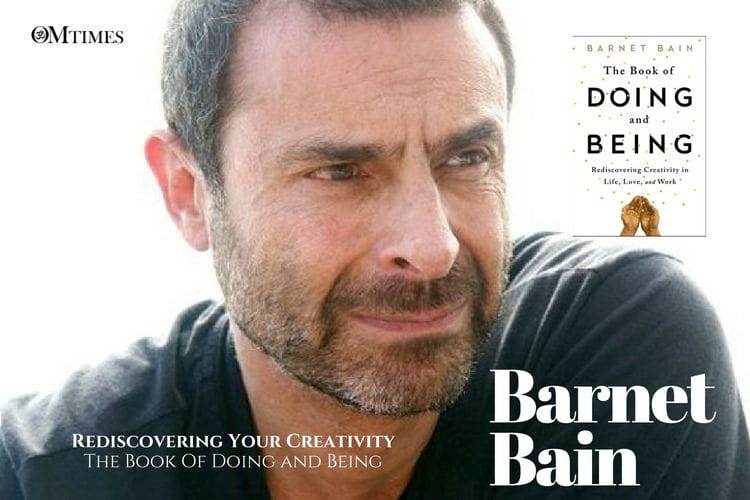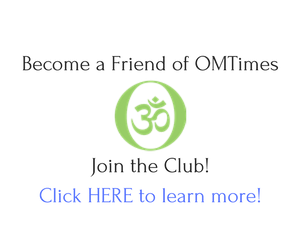Barnet Bain: Rediscovering Your Creativity

Barnet Bain is an award-winning filmmaker, broadcaster, educator, and creativity expert. His film credits include “What Dreams May Come” with Robin Williams, “Homeless to Harvard,” “The Celestine Prophecy,” and “Milton’s Secret” with Donald Sutherland. He is the author of The Book Of Doing and Being, in which he shares why creativity is the one skill set that can give us the resilience to thrive through the rapid changes we face today.
Barnet Bain: Rediscovering Your Creativity – The Book Of Doing and Being
Interview by Sandie Sedgbeer In a world that’s changing more rapidly than we can keep up with, in which lightning advances in technology are wiping out entire industries and jobs. Where warranties once attached to a lifetime of training, skills, and knowledge is fast becoming worthless, how do we create a new sense of security for ourselves; a new purpose, a new passion, new careers? According to Barnet Bain, in a future where nothing is guaranteed, success now hinges on one quality that all of us possess, but few of us appreciate? our ability to dream, to innovate, to create.
In a world that’s changing more rapidly than we can keep up with, in which lightning advances in technology are wiping out entire industries and jobs. Where warranties once attached to a lifetime of training, skills, and knowledge is fast becoming worthless, how do we create a new sense of security for ourselves; a new purpose, a new passion, new careers? According to Barnet Bain, in a future where nothing is guaranteed, success now hinges on one quality that all of us possess, but few of us appreciate? our ability to dream, to innovate, to create.
To listen to the full interview of Barnet Bain by Sandie Sedgbeer on the OMTimes Radio show, What Is Going OM, click the player below.
Interview with Barnet Bain
Sandie Sedgbeer: Your creative output is quite prodigious. You’ve written, directed and produced some very creative films, you teach creativity workshops, you consult with business executives and private clients, and you’ve written two books. At what point did you feel compelled to extend yourself beyond the film industry to teaching what you’ve learned about creativity in workshops and books?
Barnet Bain: It sort of went the other way around. For as far back as I can remember, I had some sense that creativity was love’s work and that creativity is how humans express their consciousness. So that has always been my primary interest.
I’ve been both a seeker and a finder for as long as I can remember. Along the way, certain expressions of that journey show up as being a husband, a father, a writer, a filmmaker, and being a teacher, but it’s not the other way around. These are simply the organic expressions of developing and expanding consciousness.
Sandie Sedgbeer: Many people believe they’re not especially creative, but we only have to look at children to know that creativity is a quality that’s innate within all of us. So, why do you think it is that, as adults, we tend to compartmentalize and even minimize its role in our lives?
Barnet Bain: There is no such thing as an uncreative act or an uncreative moment. Humans are always creating all of the time with every thought, choice, belief, decision, emotion, and with every feeling and mood. These are all creative acts. They’re not always aware acts. They’re not always conscious acts. But, they are nonetheless acts of personal volition, and they are always creative.
But, what’s happened is that as a secular society we have siloed out a very narrow bandwidth of activity that we call artistic, and only consider those very narrow activities as artistic or/creative. The moment we say we’re not creative, we reduce the ability for our imaginations to expand, we foreclose on possibilities for the future, we become more driven by the past than by the future, we find ourselves in the present having a present experience that seems to repeat patterns from the past more and more.
So, I am more interested in supporting people, in modeling for people, in encouraging people to discover their lives and to begin to experience their lives as a creative act, so they become artists of being alive. I am less interested in perpetuating the idea that, unless you are a singer, a dancer, an athlete or a performer of some kind, you have no creative abilities.
Sandie Sedgbeer: Why do you believe that unlocking our creativity is so critical today, in particular?
Barnet Bain: What creativity is about when it becomes a conscious practice is healing our sense of the past, and it’s about understanding why our imaginations seem to have certain very predictable boundaries around what we expect. If I say to you that in the next five years you may find that you’re more stress-free and loving and living more expansively than you’d ever imagined or dreamed before, most people will push back on that. That, for most people, is a vision for themselves that is too large.
And the reason it’s too large is that our imaginations become structured. They become trained by the circumstances that we grow up in, by our families, our education, by our communities, our religions, and our politics. This is not bad or good; it’s just life. But, our imaginations are highly conditioned and structured in that, and we suddenly have boundaries for what is possible. So, when we develop our creative selves, the first thing that happens is those boundaries and limited ideas of self-get challenged. There are skills and practices to relieve some of the hard edges of those old belief structures, so they’re more pliable and flexible. And then, suddenly, lo and behold, our imaginations become a little bit juicier, a little bit grander, and a little bit broader.
When we have broader imaginations, it doesn’t simply lead to pretty pictures or music, it leads to an expanded menu of possibilities for the circumstances of our life, the qualities of experience that we are willing to have.’
It’s sometimes said that we get the love we think we deserve. I like to say we get the life that we expect, and we can’t have a life that is larger than what we can imagine.
So, it’s very important to begin to retrain our conditioned selves so that we have a juicier imagination. We can give and receive more love in all the varied ways that can be expressed; yes, through the traditional arts, but also, a juicier imagination empowers mothers to love children in more expansive ways and fathers to relate to families in more expansive ways, and it allows us to see and hear each other more clearly and to receive input more clearly. It allows us to expand the quality and the circumstances of our life.
We’re living in really stressful times, and there are many challenges we face that have no obvious solutions. The pace at which challenges pile up is unprecedented; we’ve never had an experience where so many challenges pile up so quickly that it’s just more than we can handle linearly. And so that’s going to require a different magnitude, different juiciness and capacity of imagination to deal with. We’re pouring 20 ounces of water into 10-ounce glasses, and we’re going to be very stressed unless we can begin to develop our imaginations to keep pace with the magnitude of the challenges that we face.
Sandie Sedgbeer: Creativity and imagination are widely undervalued in education. Arts programs are being cut from schools. What they’ve been trying to do for many years is foster conformity, not creativity. And yet, what we see now, as you point out in your book, is that the kinds of jobs they have been training and teaching people to be ready for won’t exist by the time today’s kids leave school, which leaves many kids in a very challenging place, unprepared for the future.
Barnet Bain: That’s so, so true. Many people would be surprised if they had a sense of the kinds of jobs that will not exist in a very few years; there will be no need for most lawyers and accountants. So many of what were considered safe jobs? white- and blue-collar jobs? have been replaced by technology and automation. So, it is critical that we begin to learn how to develop our imaginations and creative capacities. And that begins with understanding ourselves and the ways that our ideas and feelings about ourselves, our thoughts, self-images and belief structures were conditioned and trained so that we can make peace with that for us to expand those ideas.
It’s these personal psychologies that have to be understood, and then they can be dismantled. They can be grown. Then we have all kinds of opportunities to do innovation.
Continue to Page 2 of the Interview with Barnet Bain
A veteran broadcaster, author, and media consultant, Sandie Sedgbeer brings her incisive interviewing style to a brand new series of radio programs, What Is Going OM on OMTimes Radio, showcasing the world’s leading thinkers, scientists, authors, educators and parenting experts whose ideas are at the cutting edge. A professional journalist who cut her teeth in the ultra-competitive world of British newspapers and magazines, Sandie has interviewed a wide range of personalities from authors, scientists, celebrities, spiritual teachers, and politicians.




